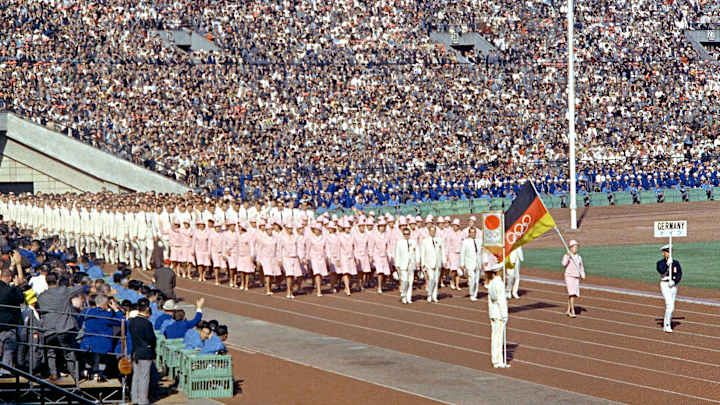Olympians who found workaround to political circumstances

Track officials say Russian whistleblower Yulia Stepanova could be allowed to compete at the Olympics even though the rest of the Russian track team remains banned.
The IAAF, track and field's world governing body, said its doping review board accepted Stepanova's application to compete as an independent athlete under ''exceptional eligibility'' rules. Even if approved by the full International Olympic Committee, Stepanova wouldn't be the first to find a workaround to political circumstances.
She would join this list of Olympians who competed under unusual conditions, such as for nations that were in the process of unifying, breaking up or boycotting the Olympics.
---
1956, 1960, 1964 Summer and Winter Games
While Germany was a divided country - West Germany and East Germany - from 1956 to 1964, the two sides came together and participated at the Olympics as the Unified Team of Germany. In the case of the Germany Olympic soccer team, the West and the East played each other for the right to represent Germany in the Olympics. The team's Olympic flag looked like the German flag, except with white Olympic rings in the middle. Germany reunited as one nation in 1992.
---
1980 Moscow Summer Olympics
Under the direction of American President Jimmy Carter, 65 countries decided to participate in a U.S.-led boycott of the Olympics because of the Soviet invasion of Afghanistan. However, some athletes from boycotting countries participated in the games under the Olympic flag. Britain was one of those countries that went to Moscow and competed under the Olympic flag. Sebastian Coe, now president of the IAAF, won the first of his two gold medals in the 1,500 meters under the Olympic flag. The Olympic Anthem replaced the athletes' national anthem at the medal ceremonies.
---
1984 Los Angeles Summer Olympics
Starting in 1984, Taiwanese athletes began participating at the Olympics as ''Chinese Taipei,'' after competing earlier as both the Republic of China and then Taiwan. The term is deliberately ambiguous because China does not recognize Taiwan politically. At the flag ceremony at the Olympics, the National Flag Anthem of the Republic of China is played instead of the National Anthem of the Republic of China.
---
1992 Albertville Winter Olympics
With the collapse of the Soviet Union, six states - Armenia, Belarus, Kazakhstan, Russia, Ukraine, and Uzbekistan - came together and created a ''Unified Team.'' The team won 23 medals overall.
---
1992 Barcelona Summer Olympics
The Unified Team at the games consisted of 12 of the 15 former Soviet Union republics - Armenia, Azerbaijan, Belarus, Georgia, Kazakhstan, Kyrgyzstan, Moldova, Russia, Tajikistan, Turkmenistan, Ukraine and Uzbekistan. The 475-member team earned a total of 112 medals, 45 of them gold.
Athletes from Yugoslavia and Macedonia also competed as independent Olympic participants, with Macedonia not having its national Olympic committee formed and Yugoslavia under United Nations sanctions.
---
2000, 2004 Summer Olympics, 2006 Winter Olympics
North and South Korea walked together under one flag at the opening ceremonies of the 2000 and 2004 Summer Olympics as well as the 2006 Winter Olympics. The flag was known as the Korean Unification Flag and was used as early as 1991 when the countries competed together at the World Table Tennis Championship in Chiba, Japan. While North and South Korea walked together, they competed separately.
At the 2000 Summer Olympics, athletes from East Timor competed as independent athletes under the Olympic flag. East Timor was in transition to becoming independent at the time.
---
2012 London Olympics
Four athletes competed as independent Olympic athletes in 2012. They hailed from the former Netherland Antilles and from South Sudan. The Netherlands Antilles Olympic Committee had its membership withdrawn in July 2011, but three athletes who qualified for 2012 were still allowed to participate under the Olympic flag. Guor Marial, who fled to the U.S. from Sudan as a child to escape the bloody conflict there, rejected an offer to run under Sudan's flag following its bitter divorce with his homeland, South Sudan.
---
2014 Sochi Olympics
Three athletes from India entered the games as independent Olympic participants and competed under the Olympic flag because of the suspension of the Indian Olympic Association by the IOC since 2012. However, on Feb. 11, four days after the start of the games, the IOC reinstated the Indian Olympic Association and allowed the remaining two athletes who had yet to participate to compete under the Indian flag.
---
2016 Rio Olympics
Under the name of the Refugee Olympic Team, 10 refugees will be competing in Rio de Janeiro under the Olympic flag. The refugee athletes range in origin from Syria, South Sudan, Ethiopia and Congo.
The IOC also authorized athletes from Kuwait to compete under the Olympic flag in Rio because their national Olympic committee remains suspended over government interference.
